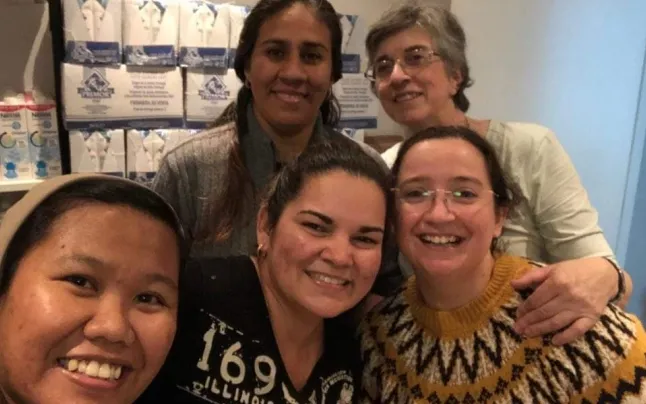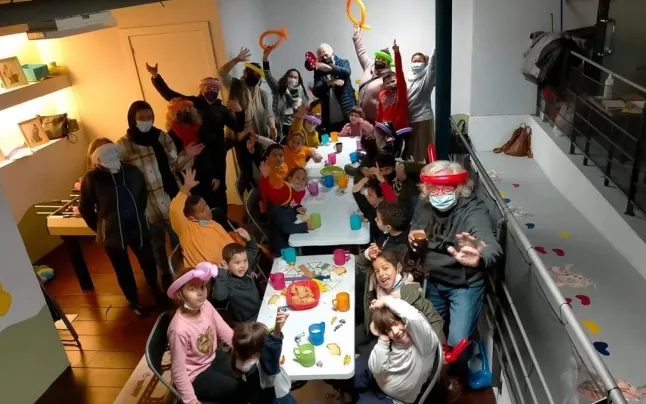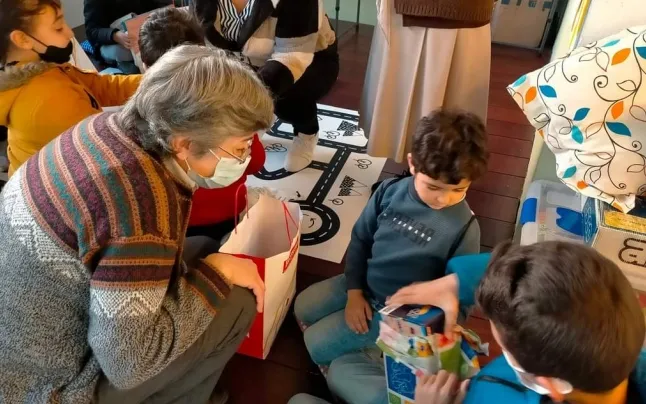The Associació Infància Robada El Vendrell (El Vendrell Stolen Children’s Association) seeks to raise awareness about the problem of human trafficking and attends to all kinds of people who are victims of this invisible reality.
Marcela Macagno and Olga Olano, linked to the Carmelite Missionaries Sisters of Saint Teresia, arrived in El Vendrell and caught a reality of vulnerability that they didn't expect to find. His response was to launch the Associació Infància Robada El Vendrell (El Vendrell Stolen Children’s Association), an organization that has been working since the end of 2020 to raise awareness about the problem of human trafficking, breaking down barriers and opening doors. During this time, they have cared for more than six hundred people, with special care for children in vulnerable situations.
Why did the organization focus on the issue of human trafficking?
Marcela Macagno (M.M): The people who promoted Infància Robada El Vendrell are religious, from the Teresian Carmelite Missionary Sisters, and we already had experience in the field of human trafficking. When we were assigned to El Vendrell and we were able to grasp the reality around us, we became aware that many of the risk factors and indicators that often result in human trafficking situations were met.
What are these risk factors?
M.M: They are diverse, and they always have in common the enormous vulnerability of the victims. Let's talk, for example, about the context of drug use and sale, also about prostitution, which is here and which are situations that can favor human trafficking. In addition, the large number of migrants in an irregular situation, who cannot access a decent job and are dragged into situations of labor exploitation, are also a breeding ground for human trafficking.
So, in this context, you were encouraged to found the association.
Olga Olano (O.O): That's right. Infància Robada is an organization that, at the level of the congregation, was born more than thirty years ago in Argentina and has a presence in other countries such as Portugal. We wanted to give continuity to this work that we have as a congregation, basically to respond to the needs of the people.
These are the goals of El Vendrell Robbed Childhood.
M.M: The main goal is to accompany and welcome victims and survivors of human trafficking, in a very broad sense of the term. That is, to victims of violence in all its spectrum, from the physical, sexual, emotional, work, etc. And, as a second goal, we wanted to create what is today the Maria and Joseph Center, as a space for the prevention of all this violence.
O.O: The center, which we opened in June 2021, is open to all kinds of people who need support. We work, for example, with many women in precarious situations. At the same time, it is a space where we have developed a set of projects dedicated to children in vulnerable situations, ranging from care and reception to school support initiatives, play spaces, psychological support, etc.
So, could we define you as a host?
M.M: Yes, hospitality is the fundamental principle of the association. Whatever the person’s needs, with us, listening is guaranteed. We sit down with her, listen to her, and see her situation. And, of course, if it is within what we as an entity can accompany and address, we do.
What if you can't find the right fit?
M.M: Another central pillar of the association is networking. Therefore, if we encounter a situation that we cannot manage or exceeds what we can do, we refer the person to the appropriate institutions.
Broadly speaking, what are the issues facing people who come to the association?
O.O: Job insecurity, which mainly affects migrant groups, is one of the most common, which we encounter every day. There are also a lot of people who have problems accessing housing, there are many families who are living in squatters because they do not have access to decent housing. We have also cared for women who are suffering from gender-based violence, but perhaps the reality that has most surprised and worried us is child abuse, which we thought would be more timely and has surprised us negatively.
How do these people come to the association?
M.M: They’re usually people knocking on our door, because we don’t deny listening to anyone. We also have families who come from other institutions, not only from Vendrell but also from the surrounding villages.
And you are trained to deal with these situations.
M.M: All the staff we have, including the volunteers, are qualified and professional staff, each in their area. We have doctors, psychologists, social workers, lawyers, and so on. And the experience of working with victims of this scourge of human trafficking.
"The reality that has most surprised and worried us is that of child abuse"
Did you mention volunteers, how important they are to the association?
O.O .: We always say that they are the heart of the association. We are very clear that without them we would not be able to do even a small percentage of what we do. They are absolutely fundamental to us, because of their effort and dedication. Each person who wants to collaborate with the organization goes through a personal interview to find out what their profile is and how they can fit in. And we try to make them play a leading role in everything they do.
Let’s talk about the entity’s projects, what are the main ones?
M.M .: Each of them points to a specific situation. We have a child protection program, which is based on playful support and works on values education to deal with issues such as bullying, which suffer greatly from the children we accompany and with whom we do psychological support work.
We also have an accompaniment program, open to anyone, where you can find a space where you can listen and be accompanied in whatever you need. For example, if you have to go through paperwork, or seek psychological help, file a complaint… We support all the processes that involve the recovery of a victim from all kinds of situations of vulnerability.
We also offer workshops and courses, such as literacy workshops for newcomers who do not know the language, as well as self-esteem workshops, which are especially important for people who are struggling and need to rebuild.
You also have a job placement program.
M.M: Yes, and it works great. We teach and help with everything that helps people find a job, such as preparing a resume or advising for a job interview. We also have a job market to offer options to people who have difficulty entering the working world.
Another leg of El Vendrell’s stolen childhood work is raising awareness about situations related to human trafficking, are we sufficiently aware as a society of this problem?
O.O: We think not, because it is an often invisible and underground subject. There is a part of society that lives completely alien to these issues, and I am not just referring to human trafficking, but to vulnerability in general. These are situations that are difficult to recognize even from the institutions.
M.M: Trafficking in human beings is a problem that would not exist if we as a society did not remain indifferent and afraid. If we prefer not to look at the problem, it will be perpetuated over time. But it is complicated, because it also involves powerful economic interests that do not make it easy to find a solution.
The pandemic has not helped either.
M.M: Certainly not, because it has caused problems that were already invisible to be much more so. There have been more difficulties in accessing the health systems where these situations are detected, also the closure of schools has covered situations that children lived in the homes…
Now that you're two years old, what do you think about the work of the association?
M.M: Well, we are very overwhelmed by the work, but not only are we satisfied with what we have done, but we feel very privileged and fortunate to be able to accompany so many people and help them find a space that no one had heard before. Being able to stand by them, relieve their pain and help them get out of situations of exploitation and oppression, giving them a glimmer of hope is very rewarding.
O.O .: That's right, meeting people who want to get ahead and be able to give them a chance is a gift. In fact, many of them end up joining and collaborating with the association, which makes us very happy.
How can we collaborate with the association?
M.M: At the financial level, donations can be made to the organization, but it is not the only way to collaborate, also through volunteering by giving a small part of the time. And, of course, participating in the activities we do to raise awareness and spread the problem of human trafficking. However, we believe that the best collaboration, not so much with the organization but with the cause, is to become aware that human trafficking is a serious, real and current problem. We need more social awareness to turn this situation around.
What do you have in mind for the future?
M.M: Now we are in a period of reviewing projects and this kind of thing, but the idea is to continue with all the projects that we have underway, which are working very well. And to strengthen the work of social awareness, which is fundamental.
O.O: What guides us is to keep our eyes wide open, to stay very awake to see the path that marks us in reality. It is our foundational approach: to listen to what reality tells us and to respond to people's needs.









Add new comment